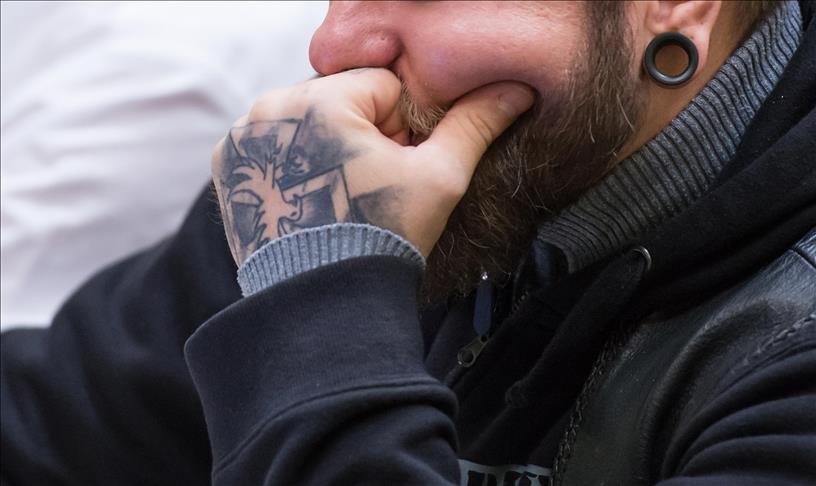
BERLIN
A key witness to the unresolved murders of the neo-Nazi terror group NSU has been found dead in her apartment in the southwestern German city of Karlsruhe, police have said.
The 20-year-old, identified as Mellisa M., had reportedly told German lawmakers behind closed doors that she felt threatened after she had given evidence on the NSU earlier this month at a parliamentary investigation committee in the southwestern state of Baden-Wurttemberg.
Police and prosecutors said on Monday that preliminary findings did not indicate a third party had been involved in the sudden death of the witness in her apartment in the town of Kraichtal.
Police said the 20-year-old had had an accident by a motorcycle on Tuesday, and is believed to have died from complications arising from a knee injury which led to a thrombus, or blood clot.
Karlsruhe police and the prosecutor’s office said in a joint statement: "The preliminary result of the autopsy on Sunday night at Heidelberg University’s Institute of Forensic Medicine and Traffic Medicine revealed that the 20-year-old woman from Kraichtal died from lung embolism."
The NSU case relates to the killing of eight small-business owners of Turkish origin, a Greek immigrant and a German policewoman between 2000 and 2007.
Sudden death
But the motives and possible links of those involved to other far-right groups and informants of the domestic intelligence services remain unclear.
German news agency DPA reported on Monday the prosecutor’s office had demanded extra medical inspections following an autopsy to examine the possible cause of the sudden death of the witness, including the possibility of poisoning.
“We are aware of the sensitivity of the case,” Tobias Wagner, a chief-prosecutor of the city of Karlsruhe told DPA.
Mellisa M. was the ex-girlfriend of former neo-Nazi, Florian H., who investigators suspected had connections to the NSU and believed he had information on the still-unresolved murder of German policewoman Michele Kiesewetter in 2007.
Florian H. was found dead in his burned-out car in Stuttgart in 2013 on the day he was going to a police station to be questioned on Kiesewetter's murder, which investigators believe was committed by the NSU.
The police said investigations revealed that Florian has committed suicide inside his car and set it on fire, but his parents told the parliamentary investigation committee in Baden-Wurttemberg that their son had received death threats.
Fake identities
Another witness in the NSU trial, former undercover agent Thomas Richter, was found dead in an apartment last April.
Richter, nicknamed “Corelli”, was believed to have information on the NSU terror cell and was due to appear in court.
Police said that his autopsy revealed that the 39-year-old Richter had previously undiagnosed diabetes and died from a diabetic shock.
The NSU terror cell is believed to have been founded by three right-wing extremists who lived underground from 1998 with fake identities.
Since the late 1990’s, Germany’s domestic intelligence agency, or BfV, recruited various informants from the right-wing scene who are believed to have had contacts with the trio.
Sharp criticism
But the agency failed to prevent the murders or arrest the suspects.
The German public only learned about the NSU and its role in the murders in November 2011, when two members of the group reportedly died in a murder-suicide following an unsuccessful bank robbery.
A third member of the group, Beate Zchaepe, is currently under arrest as the main suspect in the case, but remains silent.
The NSU scandal shocked the German public and sparked a debate on German security and intelligence organizations which were sharply criticized for underestimating the far-right threat.
Anadolu Agency website contains only a portion of the news stories offered to subscribers in the AA News Broadcasting System (HAS), and in summarized form. Please contact us for subscription options.







